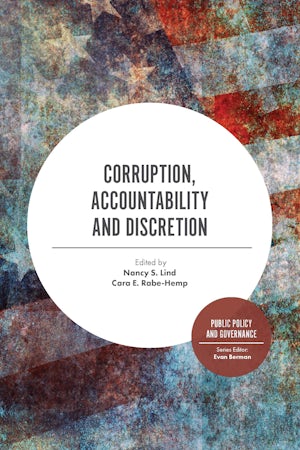
This timely and insightful book provides the key elements needed to understand the nature and prevalence of corruption in public governance, as well as the devastating public policy consequences. Read More

Political science, criminal justice, and other scholars from the US present 12 chapters on the nature and prevalence of corruption of public officials in the US and the impact on public policy, political stability, and public trust, and as well as how to establish controls on discretion and stricter regulations to increase accountability and corruption control. They consider the measurement of public corruption and how scandal in Congress influences congressional disapproval and the eroding of trust in the national government; the influence of corruption, discretion, and accountability on public governance at different levels, in the legislative system in terms of the Jack Abramoff scandal, campaign finance and the Citizens United decision, contributions to judicial campaigns in Illinois, and the effects of media coverage of corruption in terms of the 2016 presidential election; issues involving the role of crime, politics, and media imagery in the making of criminal justice policy, mayors’ and citizen attitudes towards sexual harassment in police agencies, and contractor corruption in leadership in the wars in Iraq and Afghanistan; and recommendations for oversight and accountability, including accountability after Citizens United, judicial review, and national security whistleblowers and journalists.- Annotation ©2017, (protoview.com)
Political science, criminal justice, and other scholars from the US present 12 chapters on the nature and prevalence of corruption of public officials in the US and the impact on public policy, political stability, and public trust, and as well as how to establish controls on discretion and stricter regulations to increase accountability and corruption control. They consider the measurement of public corruption and how scandal in Congress influences congressional disapproval and the eroding of trust in the national government; the influence of corruption, discretion, and accountability on public governance at different levels, in the legislative system in terms of the Jack Abramoff scandal, campaign finance and the Citizens United decision, contributions to judicial campaigns in Illinois, and the effects of media coverage of corruption in terms of the 2016 presidential election; issues involving the role of crime, politics, and media imagery in the making of criminal justice policy, mayors’ and citizen attitudes towards sexual harassment in police agencies, and contractor corruption in leadership in the wars in Iraq and Afghanistan; and recommendations for oversight and accountability, including accountability after Citizens United, judicial review, and national security whistleblowers and journalists.– Annotation ©2017, (protoview.com)